James Byeram Owens | |
|---|---|
| Deputy from
Florida to the Provisional Congress of the Confederate States | |
| In office February 4, 1861 – February 17, 1862 | |
| Preceded by | New constituency |
| Succeeded by | Constituency abolished |
| Personal details | |
| Born |
c. 1816 Fairfield County, South Carolina, U.S. |
| Died | August 1, 1889 Marion County, Florida, U.S. |
| Resting place | Evergreen Cemetery, Ocala, Florida, U.S. |
| Spouse | Louisa Owens |
| Children | Willie Owens |
James Byeram Owens ( c. 1816 – August 1, 1889) was a slaveowner and American politician who served as a Deputy from Florida to the Provisional Congress of the Confederate States from 1861 to 1862. He mounted legal arguments in defense of secession based on an originalist interpretation of the U.S. Constitution [1] and Southern arguments in favor of states' rights, with the intention of protecting the practice and institution of slavery.
Biography
Owens was born in Fairfield County, South Carolina, moving to Mississippi and later to Marion County, Florida, in 1857, with two of his brothers. [1] Owens was one of the wealthier slaveowning planters in Marion County. [2] His name appears on the 1860 Slave Census Schedules for Marion County which attribute to him the ownership of 89 enslaved persons. [3] Owens used the forced labor of enslaved people to work the land on his plantation, where cotton was grown. [1]
Owens served as a delegate from Florida at the Democratic National Conventions of 1860. At the first convention, held in Charleston, he was selected to represent the interests of Southern Democrats in a debate with Benjamin Butler of Massachusetts. Owens, along with the Florida delegation and several other entire delegations representing the Southern states, walked out of the Charleston convention and held their own convention, where they nominated John C. Breckinridge for the Democratic Party ticket in the U.S. presidential election of 1860. [1]
Owens then represented Marion County at the Secession Convention of Florida held in Tallahassee in January 1861 and was a signatory to the Ordinance of Secession which declared Florida's secession from the United States. [4] Shortly thereafter, Florida joined the Confederacy and Owens became a Deputy in the Provisional Congress of the Confederate States as well as a signatory to the Constitution of the Confederate States, representing Florida.
After the war, Owens, along with all other former Confederates, was granted a full and unconditional pardon by President Andrew Johnson in 1868.
Notable relatives
Owens was the brother-in-law of Ethelbert Barksdale and the maternal grandfather of John W. Martin, the 24th Governor of Florida, by way of his daughter, Willie Owens, and her husband, John M. Martin Jr., himself the son of John Marshall Martin.
See also
References
- ^ a b c d Cutler, H.G. (1923). History of Florida : past and present, historical and biographical, volume III. Lewis Publishing Company. pp. 8–10.
-
^ Smith, Julia Floyd (2017).
Slavery and plantation growth in Antebellum Florida, 1821-1860. Gainesville, Florida.
ISBN
978-1-947372-62-7.
OCLC
1079199321.
{{ cite book}}: CS1 maint: location missing publisher ( link) - ^ "Marion County, Florida 1860 slaveholders and 1870 African Americans". freepages.rootsweb.com. Retrieved February 22, 2022.
- ^ "Florida Secession". www.colket.org. Retrieved February 21, 2022.
- "Mrs. James B. Owens". The Ocala Evening Star. November 21, 1907.
- 1816 births
- 1889 deaths
- 19th-century American politicians
- 19th-century Baptist ministers from the United States
- American slave owners
- Burials in Florida
- Deputies and delegates to the Provisional Congress of the Confederate States
- Farmers from South Carolina
- People from Fairfield County, South Carolina
- People of Florida in the American Civil War
- Recipients of American presidential pardons
- Signers of the Confederate States Constitution
- Signers of the Provisional Constitution of the Confederate States
